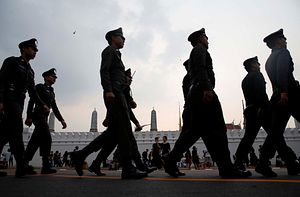On rainy afternoon days after the death of Thai King Bhumibol Adulyadej, royal household gatekeepers denied entry to foreigners as thousands of Thais streamed into Bangkok’s Grand Palace to light candles, pray, and pay respects to a monarch many revere as semi-divine. Typically one of the capital’s top tourist sites, the palace-temple complex will serve in the months ahead as the hallowed epicenter of year-long mourning rituals for Thais, a government-mandated period of inward-looking reflection on the deceased king’s storied 70-year reign.
Bhumibol’s passing has released strong waves of Thai nationalism, expressed in a widely followed black and white dress code of mourning, vigilante-style threats against those deemed as disloyal to the crown, and an upsurge of state-sought anti-royal charges, a criminal offense punishable by 15 years in prison under the country’s severe lese majeste law. As Thailand draws dolefully inward, Prime Minister General Prayut Chan-o-cha’s junta will be challenged during the long wake to coherently and convincingly separate political, economic, and palatial issues while managing a crucial and still uncertain royal succession.
Prayut was quick to assert soon after Bhumibol’s death that the kingdom would still function normally. The day after the announcement of Bhumibol’s passing, the local bourse was open for trades despite swooning on earlier reports that the monarch’s health had deteriorated. Predictions of a prolonged shutdown of commerce and government in the name of national mourning proved unfounded. The premier also maintained that his roadmap for restoring democracy, with new elections now tentatively scheduled for late 2017, would not be delayed due to the royal death, lengthy funeral rituals, and eventual coronation of a new king.
Spasms of ultra-royalist sentiment, however, indicate that Bhumibol’s passing may usher in a new era of intolerance and repression. The royal death has added yet another layer of unspeakable, untouchable issues related variously to the mourning period, an interregnum overseen by a royal adviser-led regency, and mounting questions about the status of the succession. Prayut’s announcement that heir apparent Crown Prince Vajiralongkorn asked for time to mourn before becoming king broke with the most recent succession precedent, whereby Bhumibol was invited by parliament to accept the crown hours after the mysterious shooting death of his elder brother, King Ananda Mahidol.
The militarization of Thai society, to be sure, was well underway before Bhumibol’s passing. The process could and arguably is gaining new momentum as the junta bids to fill the moral authority vacuum left in the late king’s wake with authoritarian royalist rule. Prayut’s 2014 coup, staged on the pretext of restoring order and forging reconciliation after months of destabilizing anti-government street protests, was more likely orchestrated to guarantee that royalist soldiers rather than elected politicians were in charge to steer the royal succession.
Many Thais have patiently endured the junta’s curtailment of rights and liberties in exchange for stability after years of chaotic and debilitating street politics. Yet Prayut’s rising use of the interim constitution’s Article 44, a measure that gives the premier unchallenged powers, is starting to chafe even among the junta’s diehard supporters. If popular perceptions gather that his junta is leveraging the mourning period to consolidate a more closed and insular society, public sympathy for military rule may last only as long as required for the royal rites and rituals that ensure Bhumibol’s safe passage into the Buddhist afterlife.
Pavida Pananond, a professor of economics at Bangkok’s Thammasat University, says there is a danger that looking overly inward will undermine Thailand’s international credibility. “Looked at from the outside, the situation seems like it could explode just by wearing the wrong color,” said Pavida, referring to the government-mandated dress code of mourning. “[The junta] is trying to portray that it’s business as usual, but they’re not willing to tolerate dissenting views.” A case in point: officials have in recent days intensified efforts to extradite Thais living in Western countries to face criminal charges of insulting the crown.
Others wonder if the occasion will invite more economic nationalism, derived from the spirit of Bhumibol’s inward-looking “self-sufficiency economy” concept. Military power has seeped into the economy since the coup, seen in the growing number of top-brass soldiers on the executive boards of prominent Thai companies. Moreover, some analysts saw Prayut’s use of Article 44 this year to strip an Australian mining company of a gold digging concession it held as a de facto nationalization of a foreign-invested asset. The premier’s use of executive power to trump commercial contracts, not to mention depose high level elected officials, has introduced big new regulatory risks in the economy, analysts say.
Pavida argues any lurch toward economic nationalism would necessarily contradict Prayut’s 20-year economic master plan to promote “connectivity” among ASEAN member states and the wider region and move Thailand’s economy beyond dependence on cheap labor toward more innovation-driven growth and enterprise. “There’s a danger we look inward to a past we can no longer afford to be if we’re going to become Thailand 4.0,” said Pavida, referring to the junta’s economic reform program’s slogan. “But the king’s death’s has brought up many nationalist ideas that could have a ripple effect.”
































